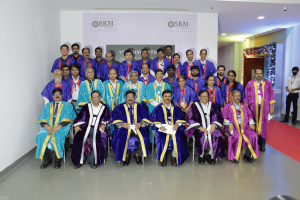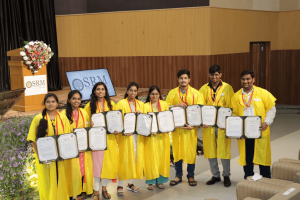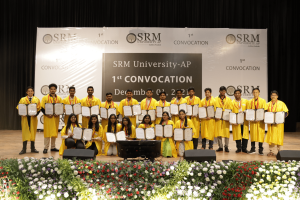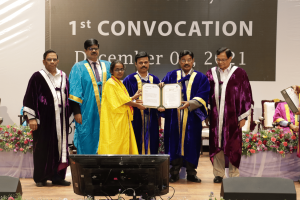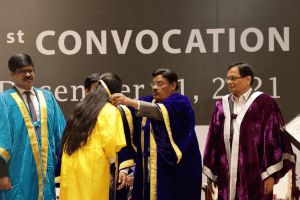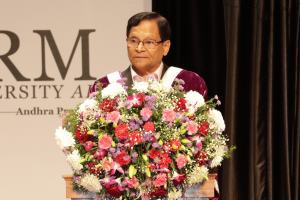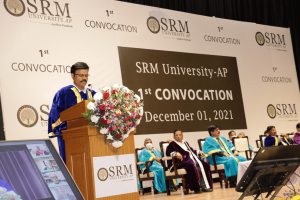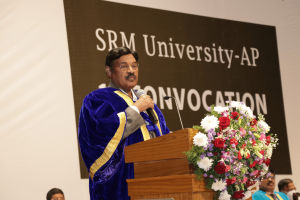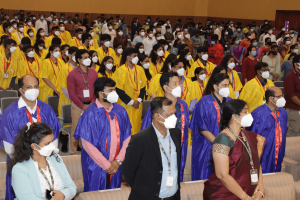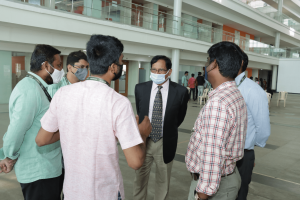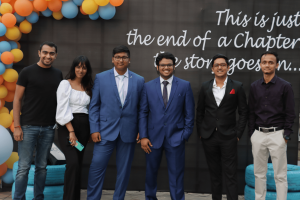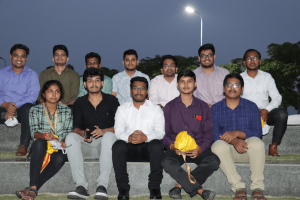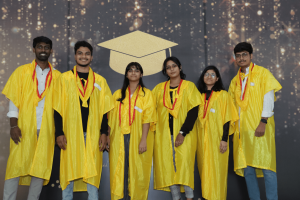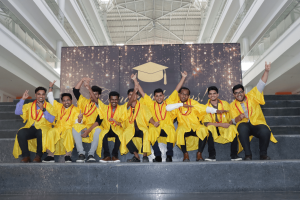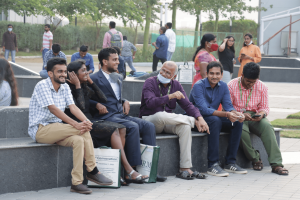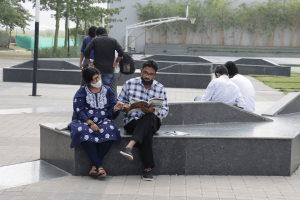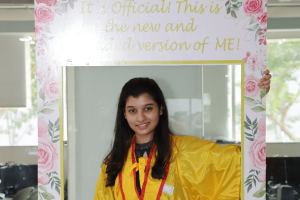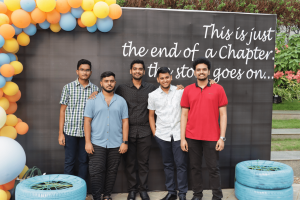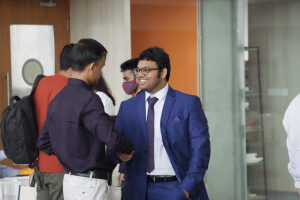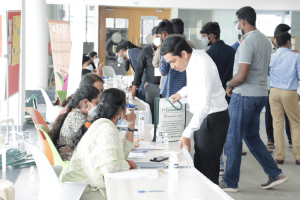1st Convocation Ceremony for Class of 2021
On an auspicious December evening, SRM University-AP observed its 1st Convocation conferring degrees to 294 undergraduates. Dignitaries across the world joined together to embrace the special moment on December 01, 2021, at the SRM University-AP campus in a hybrid mode. Dr Andrew D Hamilton, President, New York University, graced the event as the Chief Guest. An Honorary Doctorate was awarded to the Guest of Honour Dr Sethuraman Panchanathan, Director, National Science Foundation, USA.
Dr Hamilton expressed his greatest admiration towards the new university and its first batch of students. Being associated with established heritage universities all his life, he expressed his utmost joy to be a part of a nascent university full of promises and potential to create a long and illustrious history. The achievements of the past three years are an active example of the limitless possibilities that SRM University-AP nurtures. Dr Hamilton expressed his opinion saying that this era is in critical need of higher education. Similar to the story of Robert Louis Stevenson, universities have the responsibility to ‘punch through darkness’, and SRM University-AP must be one of the vanguards. “It is extraordinary to see so many laurels to be brought by the students amid COVID-19 and a worldwide pandemic,” opined Dr Hamilton extending an open invitation to SRMAP fraternity to visit NYU and be a part of it.
In his speech, Dr Seturaman Panchanathan expressed his sincere gratitude upon receiving the honorary doctorate. In his advice to the graduating batch, he presented a mantra of 6 Cs to follow in life to be worthy of honour and respect. First, a great journey begins with ‘Curiosity’. To propel towards progress, you must foster curiosity and never cease asking questions. Second, you must always find the ‘Courage’ to stay positive. Trust your abilities and embrace your failures making those into stepping stones towards success. Third, true success can never be achieved alone. It is always a ‘Collaborative’ game. Fourth, effective ‘Communication’ is the key. Get people excited about what you are doing and accelerate the development with your expertise. Fifth, ‘Commitment’ is the essence of success. Be a life-long learner and dedicated to excellence. Lastly, ‘Compassion’ is the factor to bind all these together. Dr Panchanathan encouraged the graduands to learn these mantras by heart, and success will find them in life.
“SRM University-AP was established with a vision of catering for the educational needs of the students of Andhra Pradesh and India. Our motto from the beginning is to provide a holistic education for the overall personality development of the students. On the occasion of the 1st convocation ceremony, it gives me immense joy to share that our first batch of students has been able to imbibe the vision of the university into their lives. They were able to prove their mettle on every parameter, be it academic, extra-curricular activities or research,” opined Dr T R Paarivendhar, Chancellor, SRM University-AP.
President of SRM University, Dr P Sathyanarayanan, said that the education system in India is going through a transformation with the newly enacted National Education Policy-2020. SRM University-AP aims to be the vanguard of this transition. After the successful introduction of academics, SRMAP embarks on an even more ambitious challenge of extending its research wings to add value to society. “I am proud to confess that despite being a nascent university, SRM University-AP has created a niche for itself through its research projects funded by the Government of India and reputed industry giants,” asserted President Sathyanarayanan, congratulating faculty for their incessant support and guidance to the students. “Above all, I extend my love and appreciation to my dear graduands who are joined here to receive their degrees,” added Dr Sathyanarayanan.
Prof V S Rao, Vice-Chancellor of SRM University-AP, mentioned, “Today’s convocation ceremony is to acknowledge the merit to those who have been trained, examined and undoubtedly found worthy both in character and in learning.” He further implored the graduands not to be content with the initial academic instruction but always to aim high and dream big. “All of our dreams come true if we have the bravery to follow them, if we believe in ourselves and have the courage, commitment, passion, and competitive drive to sacrifice the minor things in life in order to pay the price for the things that are worthwhile,” advised Prof V S Rao. The event ended with the presentation of degrees and medals, followed by joyous celebrations
- Published in News
1000+ Placement Offers
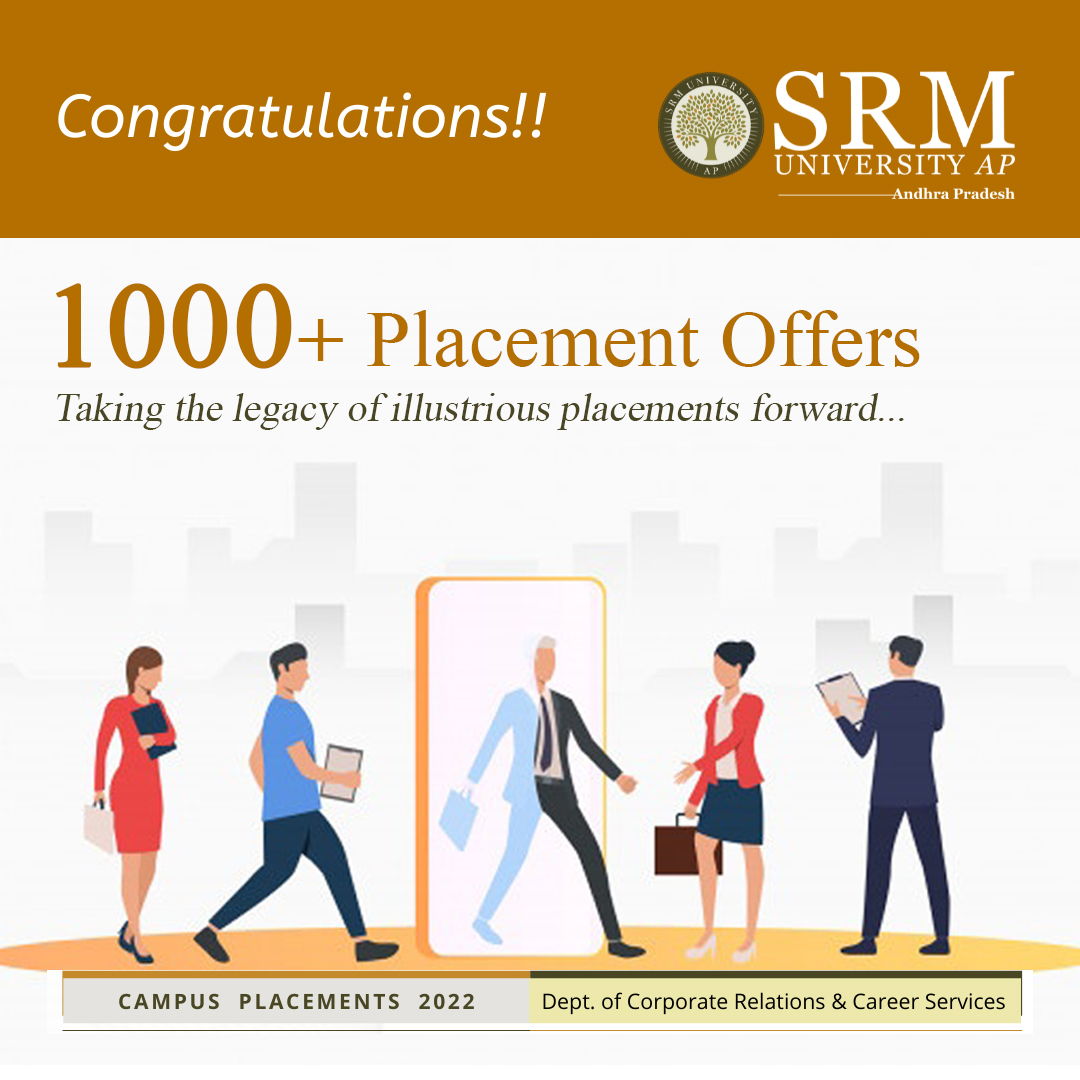 Our students have broken the highest salary for maiden batch placement offer records, our students have received best trainings and internships. And now, we can boast that we have crossed 1000+ placement offers. The Department of Corporate Relations and Career Services (CR&CS) is committed to taking the students to the next level of success. With more than 600 recruiting partners, the CR&CS team has ensured 100% placement for the students of SRM University-AP.
Our students have broken the highest salary for maiden batch placement offer records, our students have received best trainings and internships. And now, we can boast that we have crossed 1000+ placement offers. The Department of Corporate Relations and Career Services (CR&CS) is committed to taking the students to the next level of success. With more than 600 recruiting partners, the CR&CS team has ensured 100% placement for the students of SRM University-AP.
The CR&CS team regularly organises placement training sessions and provides placement support. The students were provided with skill training, industry-readiness assistance, as well as interview tips online and offline which helped many of them secure placement offers from dream companies and super dream companies with lucrative salaries.
- Published in CR&CS, CR&CS NEWS, News
“The gateway to financial freedom” with Mr Rajnikanth C S
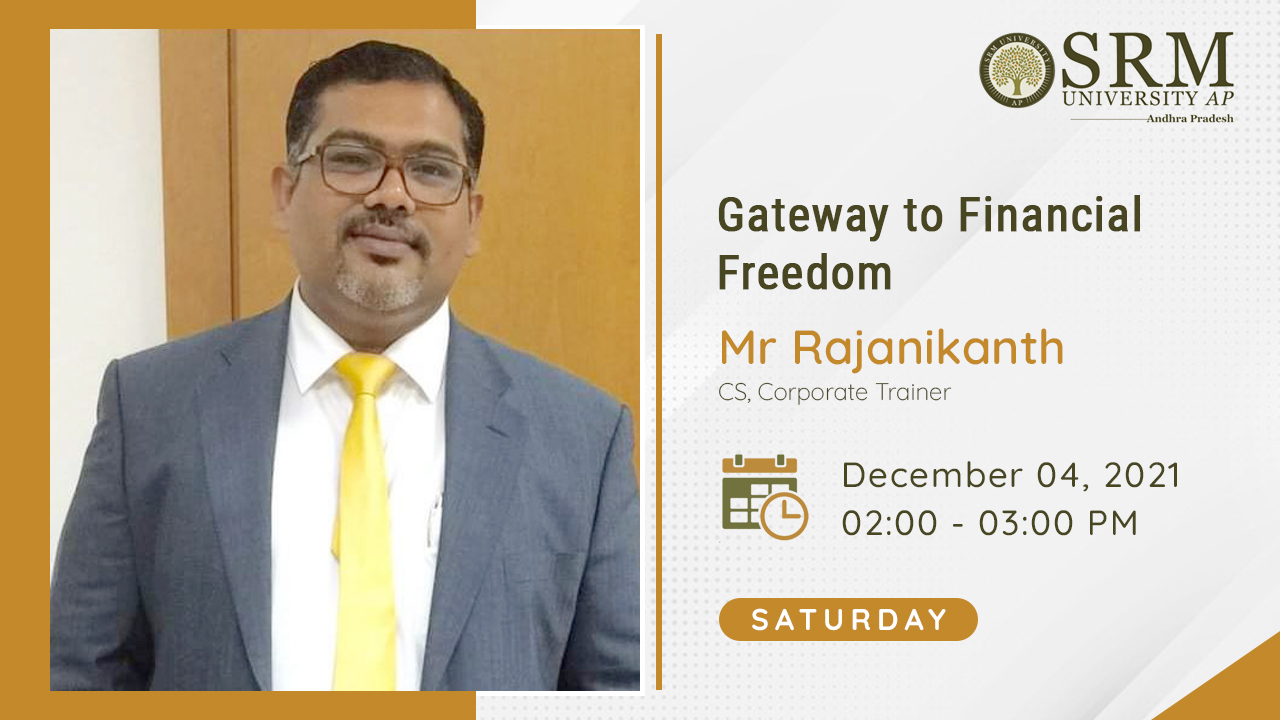
It is well accepted that there is a growing need for Industry academics tie-up to enable the students pursuing academics to understand the practical aspects of the industry simultaneously with their academic career. Hence, the Department of Corporate Relations and Career Services (CR&CS) at SRM University-AP is bringing in Corporate Trainer, Mr Rajanikanth C.S. on December 04, 2021, from 02.00 pm IST to 03.00 pm IST to tighten up the skills of our students.
About the speaker:
Mr Rajnikanth C S is a national level trainer registered with the State Skill Mission (SSM) Under the Ministry of Skill Development and Entrepreneurship India. He has delivered multiple talks as a motivational speaker. Over 5000 students and professionals have participated in his training and benefitted from them.
His understanding of the Financial Services Industry, AMCs, and Distribution Houses is expansive and the students participating in his training stand to benefit a lot from his 17+ years of industry experience in both India and abroad.
About the talk:
Financial Markets, especially the Capital Market, has the fastest growth rate amongst the various service industries. This has given many job opportunities and a challenging career to young incumbents. As a part of the CSR initiative, we are trying to enable the students to overcome the learning curve by providing practical knowledge through this Industry workshop.
In this workshop, the candidates will enjoy interactive industry sessions that can help them to acquire the concept of “financial freedom”, “basics of wealth creation & wealth management”, intricacies of the stock market, including the practical side, and career opportunities based on the current pandemic situation
So, make an opening in your calendar and do not be late, the talk starts at 02.00 pm IST and lasts till 03.00 pm IST. Be prepared to take notes on December 04, 2021, for a professional insight into having a career in finances
- Published in CR&CS, CR&CS Events, Events
Distinguished Lecture Series with Prof Ratnasingham Shivaji
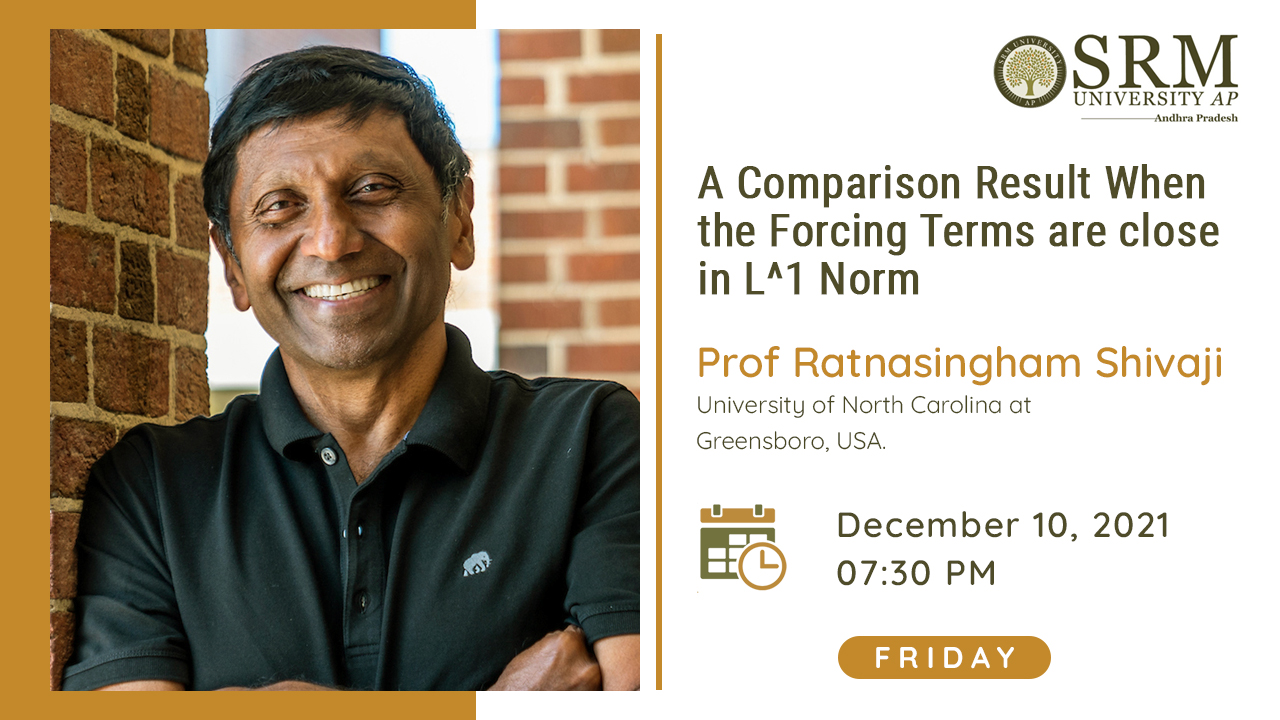 The Department of Mathematics is bringing to you the next thrilling edition of the Distinguished Lecture Series with Prof Ratnasingham Shivaji. Prof Shivaji will take the spotlight on December 10, 2021, at 7.30 pm IST and enlighten us about “A Comparison Result When the Forcing Terms are close in L^1 Norm.”
The Department of Mathematics is bringing to you the next thrilling edition of the Distinguished Lecture Series with Prof Ratnasingham Shivaji. Prof Shivaji will take the spotlight on December 10, 2021, at 7.30 pm IST and enlighten us about “A Comparison Result When the Forcing Terms are close in L^1 Norm.”
About the speaker:
Prof. Ratnasingham Shivaji received his PhD in Mathematics from Heriot-Watt University in Edinburgh, Scotland in 1981 and his B.S (first-class honours) from the University of Sri Lanka in 1977. He joined the University of North Carolina at Greensboro (UNCG) on July 1, 2011, as Head of the Department of Mathematics and Statistics and served in this position until July 31, 2019. Beginning in January of 2012, he was named H. Barton Excellence Professor. Prior to joining UNCG, he served for twenty-six years at Mississippi State University (MSU), where he was honoured as a W.L. Giles Distinguished Professor. In 2019, he was also named a Fellow of the American Mathematical Society. He is the recipient of the 2020 Mathematical Association of America (MAA) Southeastern Section Award for Distinguished University Teaching of Mathematics.
Prof. Shivaji’s area of specialization is partial differential equations, particularly in nonlinear elliptic boundary value problems. His research work has applications in combustion theory, chemical reactor theory, and population dynamics, and has been funded by the National Science Foundation and the Simon’s Foundation. Currently, he is serving as the PI on an NSF Math Ecology grant. He has authored one hundred and sixty research papers. He is a member of the Editorial Board of several mathematics journals.
Abstract:
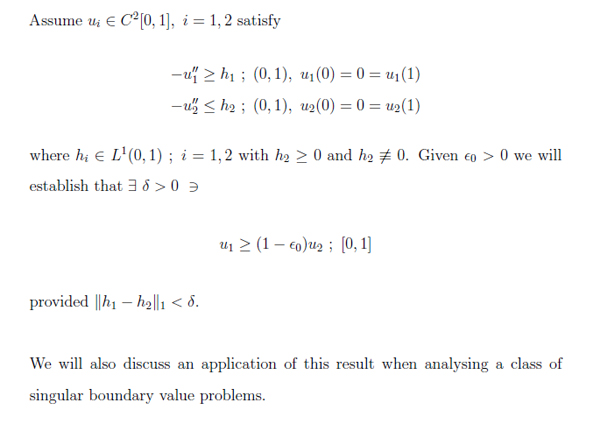
This session would provide a unique opportunity to interact with such a distinguished personality in the field of mathematics. Please make the most of this exciting opportunity on December 10, 2021, at 7.30 pm IST.
- Published in Departmental Events, Events, Math Events
On Applications of Machine Learning Methods in Physics
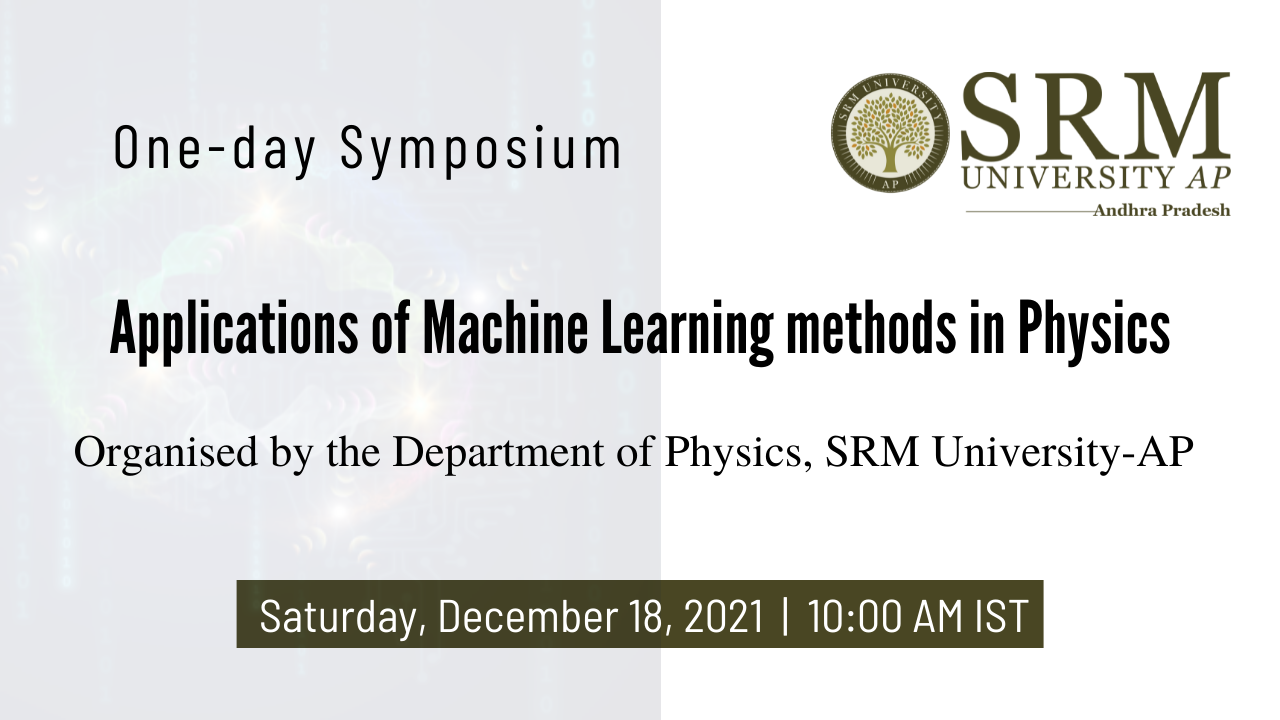
The Department of Physics at SRM University-AP is organising a one-day symposium with national and international academicians on the theme Applications of Machine Learning Methods in Physics. The programme which will begin at 10.00 am on December 18, 2021, will deeply look into two domains of research, namely Particle Physics and Statistical Physics. Eminent experts from computer science and physics domains will deliver talks for a wider audience, especially for students of basic sciences and engineering streams. The event is going to be entirely through Online mode. Dr Amit Chakraborty and Dr Soumyajyoti Biswas from the Department of Physics, SRM University-AP are the conveners of the symposium.
Programme Schedule of the Invited Lectures:
Time: 10.05 – 11.05 AM (IST)
Speaker: Prof Vineeth N Balasubramanian (IIT Hyderabad)
Title: Explainable Deep Learning: Overview, Trends and Challenges
Abstract: The last decade has seen rapid strides in Artificial Intelligence (AI) moving from being a fantasy to a reality that is a part of each one of our lives, embedded in various technologies. A catalyst of this rapid uptake has been the enormous success of deep learning methods for addressing problems in various domains including computer vision, natural language processing, and speech understanding. However, as AI makes its way into risk-sensitive and safety-critical applications such as healthcare, aerospace and finance, it is essential for AI models to not only make predictions but also be able to explain their predictions. This talk will introduce the audience to this increasingly important area of explainable AI, describe salient methods in explainable deep learning, discuss open challenges as well as present some of our recent research in this domain.
Time: 11.30 AM – 12.30 PM (IST)
Speaker: Dr Girish Varma (IIIT Hyderabad)
Title: Deep Generative Methods and Applications
Abstract: Generative methods deals with the modelling of complex high dimensional probability distributions. With the advent of deep neural networks, these methods have become more common with the discovery of new techniques like GANs. Such methods can learn to generate images, graphs etc even without using labelled data. In this talk, we will give some of the common deep generative modelling techniques like GANs, Variational Autoencoders, Normalizing Flows. We will also look at some example applications in Style Transfer, Super Resolution in Computer Vision, Conditional Generation of Molecules in Physics etc.
Time: 2.00 – 3.00 PM (IST)
Speaker: Dr Sanmay Ganguly (University of Tokyo, Japan)
Title: The Deep Relation Between Particle Physics and Machine Learning
Abstract: At the CERN Large Hadron Collider (LHC) experiment, trillions of protons get smashed with each other at very high energies every second. Remnants of this collision are collected and studied to infer what fundamental interactions are happening at the core. Analysing and extracting meaningful physics information out of this large data is a highly challenging statistical analysis, part of which has to be carried out in real-time. Modern deep learning techniques have brought a change in paradigm in the whole field, where it is observed that the application of ML truly impacts at all corners. In this presentation the speaker will try to give a general overview of the ongoing ML activities, mainly highlighting the areas in the context of LHC physics and shortly touch other branches of HEP.
Time: 3.30 – 4.30 PM (IST)
Speaker: Prof Lasse Laurson (Tampere University, Finland)
Title: Machine Learning Plastic Deformation of Crystals
Abstract: The speaker will present an overview of our recent efforts to apply machine learning to predict the fluctuating plastic deformation process of small crystals, mediated by the stress-driven motion of dislocations. To this end, we use machine learning to establish mappings between the initial state of a sample and the corresponding stress-strain curve, considering different loading protocols and geometries of the dislocation assembly. He will start with a discussion of machine learning the depinning process of edge dislocation pileups, after which he will consider the problem of machine learning-based prediction of the stress-strain response of two- dimensional systems of discrete dislocations subject to stress-controlled and strain-controlled loading.
Register soon and claim your seats at this one-day international online symposium organised by the Department of Physics, SRM University-AP!!
- Published in Departmental Events, Events, Physics, Sympossium
Dr Nimai Mishra on Impact of shell thickness on photostability studies of green-emitting “Giant” quantum dots
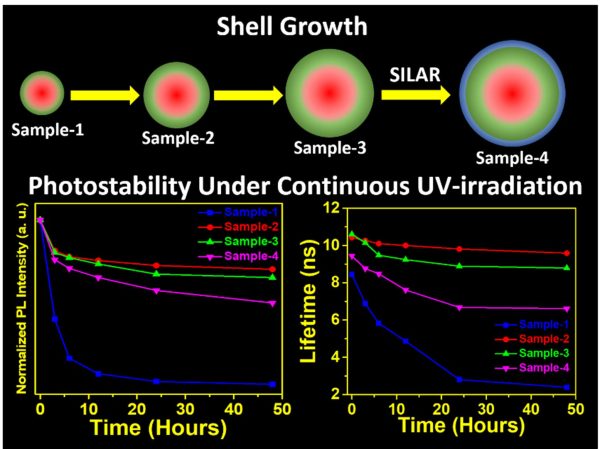 SRM University-AP is pleased to announce that Dr Nimai Mishra, Assistant Professor, Department of Chemistry, SRM University-AP, Andhra Pradesh, along with his research group comprising of students pursuing PhD under him, Mr Rahul Singh, Mr Syed Akhil, and Ms V.G.Vasavi Dutt, has published a research article titled “Shell thickness-dependent photostability studies of green-emitting “Giant” quantum dots” in the journal Nanoscale Advances (The Royal Society of Chemistry) with an impact factor of ~4.533.
SRM University-AP is pleased to announce that Dr Nimai Mishra, Assistant Professor, Department of Chemistry, SRM University-AP, Andhra Pradesh, along with his research group comprising of students pursuing PhD under him, Mr Rahul Singh, Mr Syed Akhil, and Ms V.G.Vasavi Dutt, has published a research article titled “Shell thickness-dependent photostability studies of green-emitting “Giant” quantum dots” in the journal Nanoscale Advances (The Royal Society of Chemistry) with an impact factor of ~4.533.
About the research:
Highly efficient green-emitting core/shell giant quantum dots have been synthesized through a facile “one-pot” gradient alloy approach. Furthermore, an additional ZnS shell was grown using the “Successive Ionic Layer Adsorption and Reaction” (SILAR) method. Due to the faster reactivity of Cd and Se compared to an analogue of Zn and S precursors it is presumed that CdSe nuclei are initially formed as core and gradient alloy shells simultaneously encapsulate the core in an energy-gradient manner and eventually thick ZnS shells were formed. Using this gradient alloy approach, we have synthesized four different sized green-emitting giant core-shell quantum dots to study their shell thickness-dependent photostability under continuous UV irradiation, and temperature-dependent PL properties of nanocrystals. There was a minimum effect of the UV light exposure on the photostability after a certain thickness of the shell. The QDs diameter of ≥ 8.5 nm shows substantial improvement in photostability compared to QDs with a diameter ≤ 7.12 nm when continuously irradiated under the strong UV light (8 W/cm2, 365 nm) for 48 h. The effect of temperature on the photoluminescence intensities was studied with respect to shell thickness. There were no apparent changes in PL intensities observed for the QDs ≥ 8.5 nm, on the contrary, for example, QDs with < 8.5 nm in diameter (for ~7.12 nm) show a decrease in PL intensity at higher temperatures ̴90°C.
More importantly, these results highlight the synthesized green-emitting gradient alloy QDs with superior optical properties can be used for highly efficient green emitters and are potentially applicable for the fabrication of green LEDs.
Read the full paper: https://pubs.rsc.org/en/content/articlelanding/2021/NA/D1NA00663K
- Published in Chemistry-news, Departmental News, News, Research News
Best paper presentation award in the PRISM conference
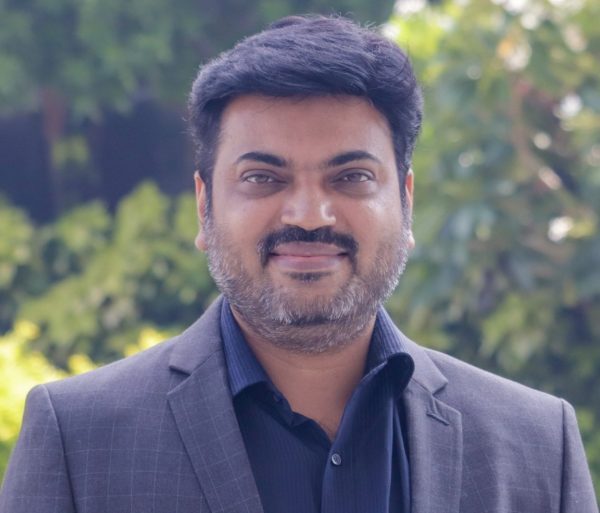 Research at SRM University-AP is always geared to top the solutions that we have to our current problems. One of the most enduring issues in the field of management is crisis management. The PRISM conference has found one of our faculty member’s solution to be most beneficial and awarded him with the Best Paper Presentation Award. Dr Vimal Babu, Associate Professor-SEAMS, has come up with a response that will not only help leaders manage crisis situations with increasing efficiency but also make it possible for them to thrive in the face of adversities.
Research at SRM University-AP is always geared to top the solutions that we have to our current problems. One of the most enduring issues in the field of management is crisis management. The PRISM conference has found one of our faculty member’s solution to be most beneficial and awarded him with the Best Paper Presentation Award. Dr Vimal Babu, Associate Professor-SEAMS, has come up with a response that will not only help leaders manage crisis situations with increasing efficiency but also make it possible for them to thrive in the face of adversities.
About the paper:
The purpose of the present research is to understand how global pandemic forces shaped the leadership communication strategies of the managers working in the Information Technology (IT) industry in India, in turn, how their leadership communication strategies aided in achieving agile and authentic leadership communication in relation to their own employees. It studied the leadership communication strategies of managers which facilitated them to establish emotional connect with the employees working remotely during pandemic crisis.
Abstract:
An investigation of the major themes in leadership communication strategies during times of crisis is presented in this research. It applies thematic analysis (TA) as a qualitative method to investigate effective leadership communication strategies in crises to overcome employee-centric organisational issues. Major themes and sub-themes are linked together to grasp better understanding about qualitative data. As a result, a total of five major themes emerged. Findings reveal that HR managers must consider the impact on their employees’ well-being when making verbal communication and crafting messages for their teams during times of crisis. The research developed a conceptual framework for mapping out the major themes, viz. information consumption and news making; disinformation and narrative disruption; agile communication structures; striking the balance b/w humane and factual communication and leadership communication imperatives. The themes generated substantive theory featuring agile and authentic leadership communication for the managers. As organisational leaders, managers’ challenges and communication strategies during a crisis are discussed. Future research ideas are highlighted.
Social Implications:
As a result of this research, it is now possible to deal with crisis communication challenges of managers more effectively. To avoid reacting to disinformation, one must be able to recognise it when it appears in abundance in a short period of time and recognise it when it does not. Managers of the HR department are held in high regard by their employees, who look to them for guidance and support. An agile communication structure, such as clearly stated goals, lean approvals and clarity of purpose will have a big impact upon the designing of communication strategies initiated by organisational leaders, especially when the attempts are made to interact with the employees remotely. That being said, managers need to strike a balance between human and factual communication in order to develop trust, transparency, and cooperation with their employees.
Collaborators:
The present work has been successfully carried out with the contributions of the co-researchers of the research paper, viz. Dr. Anugamini Priya Srivastava, Symbiosis International University, Pune and Mr. Vipin Kumar, Project Management Professional, BT India.
Future:
The future research plans entail working in the area of employee sustainability, well-being and career development of the workforce along with crisis management.
- Published in Departmental News, News, Paari Current Happenings
Cyber security enthusiast wins $1200 in Microsoft Bug Bounty Program
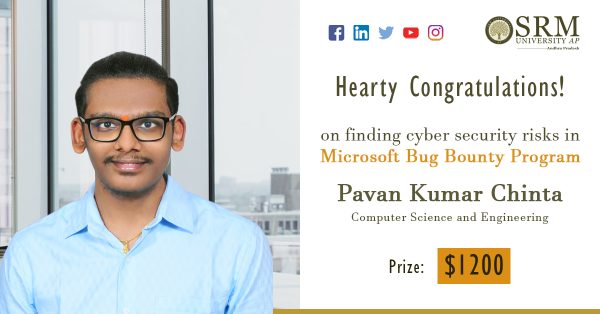 Taking your knowledge and solving real-world problems is the true intention of education. SRM University-AP is delighted to see Pavan Kumar Chinta achieve this aspiration and obtain $1200 Bounty from Microsoft Bug Bounty Program on November 13, 2021. The
Taking your knowledge and solving real-world problems is the true intention of education. SRM University-AP is delighted to see Pavan Kumar Chinta achieve this aspiration and obtain $1200 Bounty from Microsoft Bug Bounty Program on November 13, 2021. The
Bounty of $1200 was presented to Pavan by Mr Jason Pessemier, Microsoft Security Program Manager.
Pavan Kumar Chinta has keen enthusiasm with Cyber Security as specialization in the Department of Computer Science and Engineering. Microsoft is not the only company that Pavan has managed to impress.
He has also reported Server-Side Request Forgery (SSRF) a high severity bug , in Mercedes Benz portal, and Groww by finding Broken Authentication and Security Misconfiguration. He was acknowledged by both the organisations and received swags from Groww.
Pavan has spared no space in his investigation of bugs. He was acknowledged by NCIIPC (A unit of NTRO), the Government of India, for discovering Sensitive Information Disclosure like PNR, Name, Mobile Number, etc., of the passengers in IRCTC’s authorised partner. He has also reported bug issues to GeeksforGeeks and Google.
Pavan expressed “Prof. T Ragunathan, (Associate Dean (Engineering) – School of Engineering and Sciences), guided me and encouraged to study the University’s Cyber Security structures as well. With constant guidance from Dr Priyanka, Assistant Professor, Computer Science Engineering, I was able to work with pentesting tools and develop reconnaissance methodologies. This lockdown helped me to discover and build myself. His short-term goal is to secure MAMAA (Meta, Apple, Microsoft, Amazon, and Google’s parent company, Alphabet).
This is an excellent start for a 3rd-year student. We hope to see the series of security risk investigations that began here to stay with him, and that he goes on to make tremendous achievements and makes the internet a safer space.
- Published in CSE NEWS, Departmental News, News, Students Achievements
CSE student wins Best Paper award and cash prize in International conference
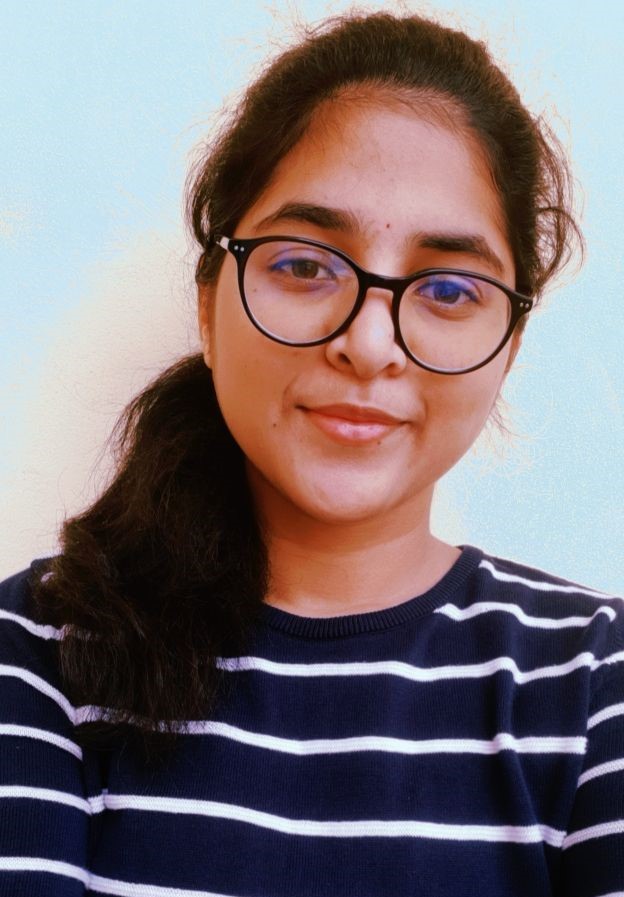 Padmaja Buggaveeti, an outstanding student from 3rd-year Computer Science Engineering at SRM University-AP, has won Best Paper (Third Prize) and a cash prize of Rs 10000 /- (Ten thousand rupees only) at the 4th ISEA Virtual International Conference on Security and Privacy 2021. Ms Padmaja, under the mentorship of her guide Dr V M Manikandan, presented a paper titled “A Novel Prediction Error Histogram Shifting-based Reversible Data Hiding Scheme for Medical Image Transmission” at the International Conference on Security and Privacy, sponsored by Information Security and Education Awareness Project Phase-II (ISEA-II) and organised by IIT (ISM) Dhanbad, India from October 27-30, 2021.
Padmaja Buggaveeti, an outstanding student from 3rd-year Computer Science Engineering at SRM University-AP, has won Best Paper (Third Prize) and a cash prize of Rs 10000 /- (Ten thousand rupees only) at the 4th ISEA Virtual International Conference on Security and Privacy 2021. Ms Padmaja, under the mentorship of her guide Dr V M Manikandan, presented a paper titled “A Novel Prediction Error Histogram Shifting-based Reversible Data Hiding Scheme for Medical Image Transmission” at the International Conference on Security and Privacy, sponsored by Information Security and Education Awareness Project Phase-II (ISEA-II) and organised by IIT (ISM) Dhanbad, India from October 27-30, 2021.
Abstract: In this paper, Ms Padmaja proposed a new prediction error histogram shifting-based reversible data hiding scheme that ensures a high embedding rate and lossless image recovery. The pixels in the images are categorised into two different classes: white pixels and black pixels based on a checkerboard pattern. To predict the black pixel value for finding the prediction, they used the average of three pixels out of 4-neighbourhood pixels, which are very close to the central pixel value. The prediction error histogram is considered for further data hiding through the histogram shifting approach. An efficient overflow handling technique is used for this. The proposed algorithms were implemented using Matlab-2020, and the experimental study of the proposed scheme is carried out on the standard medical images and natural images.
International Conference on Security and Privacy is a premier conference focused on information security and privacy. This year’s conference was sponsored by Information security and Education Awareness Project Phase-II (ISEA-II) and organised by IIT (ISM) Dhanbad, India, from October 27-30, 2021.
Prize Details: Best Paper (Third Prize) and a cash prize of Rs. 10000 /- (Ten thousand rupees only).
Let’s hear what Ms Padmaja says about her achievement!
I thank Dr V M Manikandan, Assistant Professor in the Department of Computer Science and Engineering, for his valuable guidance in this research work. Winning the best paper award and cash prize in a reputed conference, ISEA-ISAP, has strikingly boosted my confidence to do research. I am grateful to all the faculty members of the CSE Department for their kind support and encouragement throughout my study at SRM University-AP.
- Published in CSE NEWS, Departmental News, News, Research News
Dr M Naveen Kumar
- Published in Assistant Professor, CSE Faculty, Faculty, SEAS


